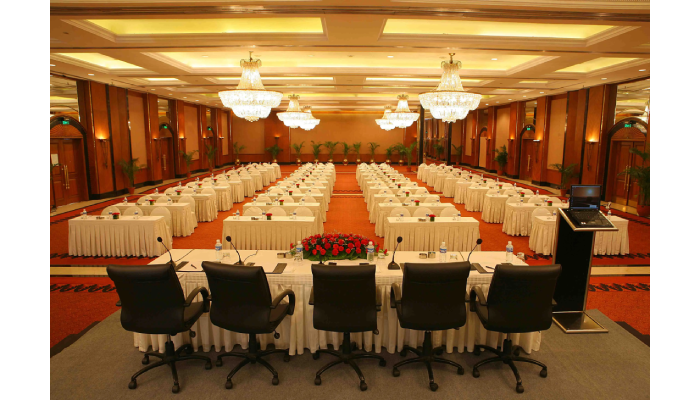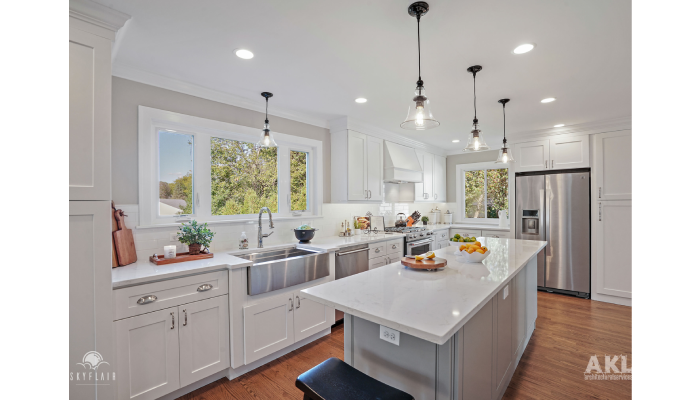Choosing the right hotel location for business meetings matters a lot because it affects many aspects of the event. Convenient hotels near airports and public transport make it easier for attendees to arrive on time and reduce travel stress. A central spot often offers not just meeting rooms but also nearby dining and entertainment options, which can improve guest satisfaction without wasting time. Plus, hotels in secure, well-known areas provide privacy needed for sensitive discussions and come with good tech support that helps the meeting run smoothly. Overall, a well-located hotel simplifies logistics while boosting productivity and creating a positive impression on clients and partners.
Accessibility and Convenience for Attendees
Choosing a hotel for business meeting near airports and major transport hubs significantly cuts down travel time for attendees coming from different cities, making it easier for them to arrive without hassle. Hotels located in or near business districts allow guests to seamlessly combine meetings with other work obligations, saving time and boosting productivity. Access to public transportation such as buses, trains, and taxis further simplifies the daily commute, especially for those unfamiliar with the area. When hotels are close to restaurants and shops, attendees can enjoy convenient breaks or informal discussions without traveling far, which helps maintain focus and energy during long meeting days. Being near event venues or corporate offices removes the need for complicated transport arrangements, making group coordination smoother and reducing the risk of delays. Convenient locations also encourage punctuality, as attendees are less likely to get lost or stuck in traffic. For those who drive, nearby parking availability adds another layer of ease, ensuring local participants can access the hotel without stress. Hotels with 24-hour reception in accessible areas accommodate varied arrival times, supporting flexible schedules. Overall, accessibility reduces stress and logistical challenges, contributing to a better experience and smoother flow for everyone involved.
How Location Enhances Guest Experience?
Choosing a hotel located in an attractive or prestigious area immediately sets a positive tone for business meetings, impressing clients and partners from the moment they arrive. Guests appreciate having cultural or leisure spots nearby, which offers meaningful ways to relax during breaks or after long meeting days without needing extensive planning. Central locations also make it easier for attendees to access quality dining and lodging options, reducing travel time and allowing them to stay focused on the agenda. When hotels partner with local businesses, guests often benefit from exclusive discounts or perks, adding extra value to their stay. Visually appealing surroundings contribute to a better mood and a more engaging atmosphere, which can subtly improve communication and collaboration. Additionally, lively neighborhoods provide informal spaces for networking outside formal sessions, helping build stronger connections. The location’s proximity to city landmarks or business centers also elevates the perceived importance and prestige of the event, reinforcing its professionalism and scale in the minds of participants.
- Hotels in attractive or prestigious areas create a positive first impression for clients and partners.
- Guests benefit from nearby cultural or leisure spots that enhance downtime during multi-day meetings.
- Partnerships with local businesses often provide discounts or perks, adding value to the guest experience.
- Central locations reduce the need to travel far for meals, allowing guests to focus more on the meeting agenda.
- Convenient access to high-quality lodging and dining supports attendee comfort and satisfaction.
- Visually appealing surroundings contribute to a positive mood and a more engaging meeting atmosphere.
- Guests appreciate the ease of exploring nearby amenities without extensive planning or travel.
- Hotels in lively neighborhoods offer opportunities for informal networking outside formal sessions.
- The location can influence guests’ perception of the event’s scale and importance.
- Close proximity to city landmarks or business centers can improve the overall prestige of the meeting.
On-Site Amenities and Meeting Facilities
Hotels situated in prime locations often provide a wide range of meeting spaces, from expansive ballrooms for large gatherings to intimate breakout rooms for focused discussions. Having these options on-site means meetings can be organized efficiently without needing to coordinate multiple venues. On-site restaurants and catering services play a key role in minimizing disruptions by delivering meals and refreshments right where the meeting takes place, keeping attendees engaged and on schedule. Additional amenities like gyms, spas, and lounges offer attendees opportunities to recharge during longer events, supporting overall wellness and focus. Business centers within the hotel provide essential services such as printing, copying, and office supplies, which help keep meetings running smoothly. Advanced audiovisual equipment available on-site ensures presentations and videoconferences meet professional standards without relying on external providers. Many hotels in central locations also have dedicated event staff who understand the specific needs of corporate meetings, offering expert assistance from setup to execution. The close proximity of guest rooms to meeting spaces allows quick transitions between sessions and rest, boosting efficiency. Outdoor areas or terraces provide flexible spots for breaks or informal networking, adding variety to the meeting environment. By offering comprehensive amenities in one place, these hotels reduce the need for outside vendors, simplifying logistics and saving time. Secure, soundproof meeting rooms further protect confidentiality and help maintain focus throughout the event.
Location’s Effect on Productivity and Creativity
Choosing a hotel in the right location can significantly boost both productivity and creativity during business meetings. When participants step away from their usual office setting to a well-placed hotel, they often experience improved focus and motivation. Being removed from everyday distractions allows attendees to engage more deeply in discussions, leading to better decision-making. Hotels situated in attractive surroundings help create a relaxed mindset, which encourages creative problem-solving. For example, a hotel near a park or with access to outdoor spaces offers participants a chance to take mental breaks, refresh their thinking, and return to meetings with renewed energy. Central locations also make it easier for attendees to balance intense work sessions with rest or exercise, supporting overall well-being and sustained concentration. Additionally, hotels in business districts can stimulate a professional mindset aligned with work goals, while those near cultural or innovation hubs may inspire fresh ideas and valuable networking opportunities. Natural light and pleasant views in meeting rooms further enhance alertness and engagement. Finally, minimizing travel fatigue by selecting accessible hotels helps maintain participant energy levels throughout the event, ensuring productive and creative outcomes.
Ensuring Privacy and Security Through Location
Choosing a hotel in a safe neighborhood is essential for maintaining privacy and security during business meetings. Such locations provide a secure environment where sensitive discussions can take place without worry. Hotels that serve corporate clients often implement controlled access to meeting rooms, preventing unauthorized entry and ensuring confidentiality. Many also offer private entrances or exclusive floors for business events, which helps limit exposure and distractions. Additionally, staff at these hotels are usually trained in privacy protocols, enhancing the overall security experience. Physical security features like surveillance cameras and on-site personnel add another layer of protection. Secure Wi-Fi and reliable technology infrastructure in prime locations safeguard business communications from potential breaches. Proximity to emergency services ensures quick assistance if any issues arise, giving peace of mind to organizers and attendees alike. Features such as private dining rooms and lounges enable discreet networking and conversations, while secure parking and valet services reduce risks related to vehicle access. Altogether, the location’s security measures play a vital role in creating a trustworthy setting for important business meetings.
Technology and Logistical Support Linked to Location
Hotels located in business districts or central urban areas often provide the latest audiovisual and IT equipment, which is essential for seamless presentations and virtual meetings. High-speed internet access is typically standard, supporting smooth video conferencing and real-time collaboration. These hotels usually have on-site technical support teams ready to assist with setup and troubleshooting, ensuring events run without technical interruptions. The convenient location also makes it easier to deliver and set up additional equipment quickly, thanks to accessible loading areas and proximity to local vendors. Event coordinators experienced with corporate needs are commonly available, helping manage logistics like catering, room arrangements, and timely delivery of materials. Many such hotels feature business centers offering office supplies and secretarial help, further simplifying event management. Reliable power backup systems are another benefit, preventing disruptions during critical moments. Being centrally located also helps coordinate with guest speakers and external participants more efficiently, reducing delays and enhancing the overall flow of meetings.
Simplifying Booking and Coordination with Location
Hotels located in accessible, central areas make booking and organizing business meetings much easier. When a hotel is in a prime location, group reservations for rooms and meeting spaces can often be handled through centralized platforms that streamline the entire process. This reduces the administrative burden on organizers and ensures attendees can secure accommodations and meeting spots quickly. Hotels that regularly host business events tend to offer negotiated group rates, making it more cost-effective to book multiple rooms. Having the venue close to where attendees live or work cuts down on travel complications, which simplifies scheduling and reduces the risk of delays or cancellations. Experienced hotel staff in business hubs are familiar with corporate needs, from arranging catering and audiovisual equipment to accommodating last-minute changes in group size or timing. Coordinating multiple services within one hotel also minimizes communication gaps, as all requests go through a single point of contact. Additionally, many centrally located hotels provide shuttle services or help coordinate local transportation, making it easier for guests to arrive on time. Clear signage and accessible entrances further aid in smooth navigation, so attendees spend less time searching for meeting rooms and more time focused on the event itself. For example, a hotel near a major airport with flexible booking policies and an in-house catering team can handle last-minute adjustments without disrupting the meeting flow, which is invaluable for busy business groups.
Reputation and Brand Image Tied to Hotel Location
Choosing a hotel in a well-known or prestigious location plays a key role in shaping how a business meeting is perceived. Hosting an event at a hotel located in a recognized business district or a landmark area sends a clear message of professionalism and commitment to quality. This association with a reputable hotel brand can boost client trust and confidence, as it reflects the organizer’s attention to detail and high standards. For example, selecting a hotel known for hosting major corporate events or high-profile gatherings adds an air of importance and exclusivity to the meeting. Moreover, hotels that emphasize sustainability or actively support their local community enhance a company’s image of corporate responsibility. The quality of the surrounding infrastructure, from transportation to dining options, also mirrors the company’s values and operational standards, influencing stakeholder perceptions positively. When event materials and marketing highlight the association with top-tier hotels, it lends additional credibility, often resulting in better media coverage and public relations outcomes.
Networking Opportunities in Central Hotel Locations
Hotels located in busy city centers offer more than just convenient meeting spaces; they provide informal settings like lounges and bars that naturally encourage networking. These areas make it easy for attendees to strike up conversations, leading to valuable connections beyond scheduled sessions. Being close to local professionals and business leaders means guests can quickly access nearby venues for after-hours socializing or informal meetups, which often strengthen business relationships. Central locations also attract a diverse crowd, increasing the chances of encountering new perspectives and potential partners. Proximity to cultural or business events adds extra opportunities for interaction, whether at a networking breakfast, lunch, or reception. Shared hotel spaces foster spontaneous conversations and idea exchanges, while nearby coworking spaces or innovation hubs allow networking to continue beyond the formal meeting. Easy access to transportation encourages participants to extend their stay, tapping into local business events that can spark partnerships or collaborations well after the meeting concludes.
Cost Efficiency and Value of Prime Locations
Choosing a hotel in a prime location for business meetings might come with higher upfront costs, but it often leads to significant savings in other areas. Hotels centrally located near airports and transportation hubs reduce indirect expenses like shuttle services or taxi fares for attendees. This convenience minimizes lost time due to commuting, which can improve overall meeting efficiency and even shorten meeting durations. Additionally, many hotels in busy areas offer group discounts or bundled services that help offset the higher base prices. Having all essential services such as catering, technical support, and lodging under one roof lowers the need for external vendors, cutting down on coordination costs and reducing the risk of disruptions. Reliable service in these prime locations ensures meetings run smoothly, avoiding costly delays or technical issues. Moreover, central locations tend to boost attendee turnout, which increases the return on investment by maximizing engagement and participation. In the end, investing in a well-located hotel supports professional outcomes and can justify the extra expense through improved productivity and overall value.

Mary Burns is a dedicated writer focusing on health and fitness topics. With a passion for promoting wellness and vitality, Mary shares her knowledge and expertise through engaging and informative blog posts.




